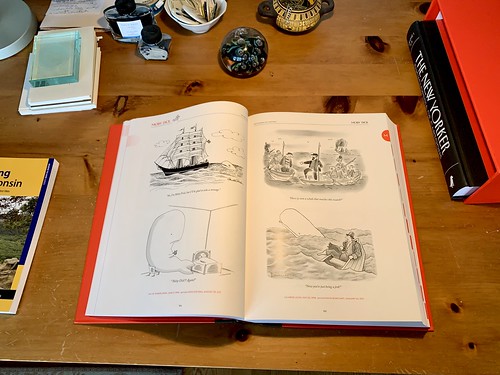"... not a love triangle or intimate domestic saga. Nineteenth-century men of letters 'saw the matter of American experience as inherently male,' the literary critic Nina Baym wrote in her 1981 essay 'Melodramas of Beset Manhood.' It was a complete negation of women’s points of view, not just an artistic dismissal. That doesn’t mean American women’s fiction wasn’t popular — like 'Little Women,' Harriet Beecher Stowe’s 'Uncle Tom’s Cabin' could barely keep up with demand after its 1852 publication. But that widespread appeal was used to slight the genre out of hand and further relegate it to the status of mere entertainment. As Ms. Baym noted, Nathaniel Hawthorne, for one, complained in 1855 about the 'damned mob of scribbling women' whose inexplicably popular work he feared would hurt his own book sales. There’s some truth in the notion that women strove to write works that would sell — Ms. Alcott herself said she wrote 'Little Women' 'at record speed for money' while men toiled away on epics like 'Moby-Dick' that would fail to generate much income.... It may be that on its surface, 'Little Women' doesn’t seem as fresh and progressive, comparatively. Maybe men feel it’s too familiar — the book has been turned into a movie no fewer than seven times, including a little-seen version released just last year. But in an era when sequels and remakes clog the film landscape (many of them male-centered), it’s hardly an exception...."
From
"Men Are Dismissing ‘Little Women.’ What a Surprise/The rejection of the latest screen adaptation of the beloved novel echoes a long-held sentiment toward women-centered narratives" by Kristy Eldredge (in the NYT). Eldredge is responding to a tweet by Janet Maslin, which read: "The 'Little Women' problem with men is very real. I don’t say that lightly and am very alarmed/In the past day have been told by 3 male friends who usually trust me that they either refuse to see it or probably won’t have time."
1. The media churn up this notion that you're
supposed to see films. But, really, there doesn't need to be a reason
not to see a film. There needs to be a reason
to see a film. And films are aimed at particular sorts of people. It's absurd to criticize anyone, ever, for "rejection" of a film. Reject them all! The presumption is
no. Then select only what feels right for you, what's worth
your time and attention.
2. Almost
no one needs to select another remake of "Little Women" as what they will allow to occupy their own precious mind for 2 hours. It doesn't matter that it's well made and the acting is good or whatever. Select it if it serves
you. You don't owe Hollywood anything. Hollywood makes its offer to
you, and you will be saying no to almost anything.
3. There's no reason for anyone to feel a gender-based obligation to see this or that. If something doesn't appeal to you, go somewhere else. The movie was made with intense conniving to appeal based on gender. "Little Women" gets the women that go to the movie in response to that appeal. Rather than say men ought to strive against their feeling of gender-based exclusion, I'd say women ought to strive against the pull of gender-based
inclusion.
4. Louisa May Alcott herself had a distaste for what she was doing writing that book specifically for females! She wrote in her journal (quoted at
"Girls adored ‘Little Women.’ Louisa May Alcott did not." (WaPo): "Mr. N wants a girls’ story, and I begin ‘Little Women.’ … I plod away, though I don’t enjoy this sort of thing. Never liked girls or knew many, except my sisters; but our queer plays and experiences may prove interesting, though I doubt it."
5. I wrote "females" under point #4 because you can see she was writing for
girls — not women. It's a young adult novel. "Little Women" are "little" in the sense that they are very young. They're girls. It's horrifying that
women are catered to with this story over and over again. Why is
any adult interested in this material? Ask that, rather than ask why adult men are not interested.
6. Let people be interested in in the stories they're actually interested in. Don't push them to invent an interest to something that does not call out to them. It's awful to lose touch with what you really feel, who you really are, and to generate a false sense of interest in what you've been enticed to think you ought to like. That's a general problem in life, not specific to movies.
7. Does the question what is "the essential American story" have any serious meaning in the context of what movies people are choosing to go to see? Even if it's true that males dominate the activity of deciding what is "essential" and what is "American" — or what is "the intellectual high ground" — that has little relevance to the question of what's the next movie you're going to see. Let's assume "Moby-Dick" is that thing. I don't see any good film adaptations of "Moby-Dick"! The movies aimed at men don't come from an "intellectual high ground." They're low-culture stuff from comic books! Loads and loads of young-adult material.
8. "Moby-Dick" is not "a solo confrontation with the wilderness."





